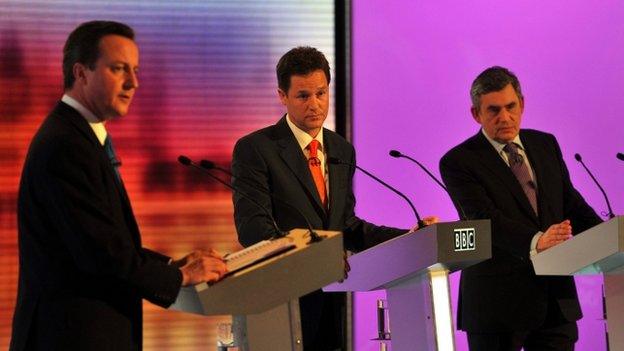Election debates - online or none at all?
- Published

The debate about when, how and where to stage prime ministerial debates at the next election has just taken another turn.
YouTube, the Telegraph and the Guardian are making a joint bid to stage an online leaders' debate.
Their pitch is that not only would this take politics into the digital age but that, unlike the broadcasters, they are not covered by a legal requirement to be impartial.
In other words they could stage a debate with two, three, four or five leaders without fear of being taken to court and found to be in breach of the BBC Charter or Ofcom regulations.
The more the merrier you might think. Why not let a thousand flowers - or a handful of different debates - bloom.
This proposal may allow more debates than last time. It may, on the other hand, kill off the idea of TV debates altogether.
How so, you may ask. After all at the last election more than 22 million people saw at least some of the three debates. Surely Britain is now well and truly in the TV democracy game?
Hullabaloo
Don't forget, though, that in the US there was a gap of 16 years after the first presidential debate in 1960. After Kennedy's charm trumped Nixon's gruffness, American voters had to wait until Gerald Ford faced Jimmy Carter in 1976. Prime ministerial debates in Australia and Canada have been irregular too.
The Conservatives have shown every sign of being nervous of a repeat of the debates we saw in 2010. The reasons why are not hard to fathom.
Many Conservatives are convinced that the 2010 debates ended David Cameron's hopes of securing a majority. They gave Nick Clegg a huge boost and the hullabaloo that surrounded them diverted the spotlight from Gordon Brown's record, they say.
Some close to Mr Cameron will argue that he should not make the same mistake twice. Why risk giving a platform to Ed Miliband to establish himself in the public mind as a potential prime minister?
More than nine million people watched Mr Brown try to woo Mr Clegg by repeatedly declaring "I agree with Nick" - the phrase that came to define the opening of the 2010 campaign.
After that first debate it soon became clear that a large number of viewers shared that sentiment. The Lib Dems' average poll rating jumped from 19% before the debate to 29% afterwards.
Hold on, say some, a fat lot of good it did him. After all, his party lost seats in the election. Therefore, goes the argument, the debates changed nothing.
Two, three or all?
The Tory high command does not believe that. Certainly Cleggmania subsided before polling day but many Tories agree with the psephologist Peter Kellner, who argues that the debates did give the Lib Dems a polling boost.
They also sucked the oxygen from a conventional campaign that would have focused on the choice between two men (Mr Cameron or Mr Brown) and one issue, the economic crisis.
I believe there is another factor too. The debates boosted the profile of Mr Clegg, making the idea of a coalition with him as deputy prime minister much more sellable than it would otherwise have been.
Now, of course, Mr Cameron has insisted that he is in favour of debates. However, he's also said that he doesn't want the next election campaign dominated by them.
He's floated the idea of three debates - one between him and Ed Miliband, adding Mr Clegg and a third involving UKIP's Nigel Farage and Natalie Bennett of the Greens.
His real objective - as was Gordon Brown's four years ago - is to engineer a one-on-one with the leader of the opposition.
The debates only happened last time because the three big news broadcasters - BBC, ITV and Sky - agreed terms, negotiated a deal together and refused to be separated.
Today's offer breaks - and, I suspect, is designed to break - their stranglehold on the timing and the format. It strengthens the negotiating hand of Number 10 and weakens that of the broadcasters.
It may lead to an online debate and a series of TV debates. Or it could sow confusion and allow Team Cameron to argue that they're tried hard but simply found it impossible to reach agreement.